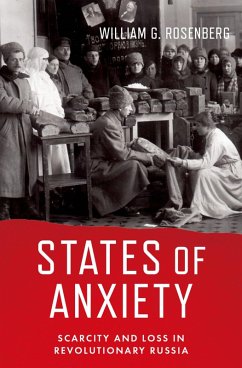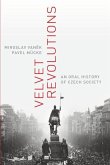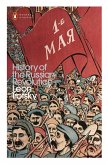William G. Rosenberg (Professor of H Professor of History Emeritus
States of Anxiety
Scarcity and Loss in Revolutionary Russia
William G. Rosenberg (Professor of H Professor of History Emeritus
States of Anxiety
Scarcity and Loss in Revolutionary Russia
- Gebundenes Buch
- Merkliste
- Auf die Merkliste
- Bewerten Bewerten
- Teilen
- Produkt teilen
- Produkterinnerung
- Produkterinnerung
States of Anxiety assesses the effects of the great scarcities and enormous losses that revolutionary Russia experienced between 1914 and 1921. Focusing on the effects of food insecurity, scarcities of other essential goods, and the losses of war in their various forms, it represents a new approach to understanding the period's politics and ideologies. In contrast to the traditional concentration on the period's politics and ideology, this imaginative reinterpretation argues for greater attention to its emotional dimensions and contributes to the historical study of emotions and its complex methodologies.…mehr
Andere Kunden interessierten sich auch für
![Velvet Revolutions Velvet Revolutions]() Miroslav Vanek (Director of the Department of Oral History and ContVelvet Revolutions43,99 €
Miroslav Vanek (Director of the Department of Oral History and ContVelvet Revolutions43,99 €![Russia in Flames Russia in Flames]() Laura Engelstein (Henry S. McNeil Professor Emerita of Russian HistRussia in Flames26,99 €
Laura Engelstein (Henry S. McNeil Professor Emerita of Russian HistRussia in Flames26,99 €![History of the Russian Revolution History of the Russian Revolution]() Leon TrotskyHistory of the Russian Revolution28,99 €
Leon TrotskyHistory of the Russian Revolution28,99 €![The Russian Revolution The Russian Revolution]() Sean McMeekinThe Russian Revolution29,99 €
Sean McMeekinThe Russian Revolution29,99 €![The Russian Revolution The Russian Revolution]() Sean McMeekinThe Russian Revolution20,99 €
Sean McMeekinThe Russian Revolution20,99 €![The Empire Must Die The Empire Must Die]() Mikhail ZygarThe Empire Must Die47,99 €
Mikhail ZygarThe Empire Must Die47,99 €![The Fate of the Bolshevik Revolution The Fate of the Bolshevik Revolution]() The Fate of the Bolshevik Revolution40,99 €
The Fate of the Bolshevik Revolution40,99 €-
-
-
States of Anxiety assesses the effects of the great scarcities and enormous losses that revolutionary Russia experienced between 1914 and 1921. Focusing on the effects of food insecurity, scarcities of other essential goods, and the losses of war in their various forms, it represents a new approach to understanding the period's politics and ideologies. In contrast to the traditional concentration on the period's politics and ideology, this imaginative reinterpretation argues for greater attention to its emotional dimensions and contributes to the historical study of emotions and its complex methodologies.
Hinweis: Dieser Artikel kann nur an eine deutsche Lieferadresse ausgeliefert werden.
Hinweis: Dieser Artikel kann nur an eine deutsche Lieferadresse ausgeliefert werden.
Produktdetails
- Produktdetails
- Verlag: Oxford University Press Inc
- Seitenzahl: 600
- Erscheinungstermin: 20. Oktober 2023
- Englisch
- Abmessung: 226mm x 163mm x 69mm
- Gewicht: 980g
- ISBN-13: 9780197610152
- ISBN-10: 0197610153
- Artikelnr.: 68888271
- Herstellerkennzeichnung
- Libri GmbH
- Europaallee 1
- 36244 Bad Hersfeld
- gpsr@libri.de
- Verlag: Oxford University Press Inc
- Seitenzahl: 600
- Erscheinungstermin: 20. Oktober 2023
- Englisch
- Abmessung: 226mm x 163mm x 69mm
- Gewicht: 980g
- ISBN-13: 9780197610152
- ISBN-10: 0197610153
- Artikelnr.: 68888271
- Herstellerkennzeichnung
- Libri GmbH
- Europaallee 1
- 36244 Bad Hersfeld
- gpsr@libri.de
William G. Rosenberg taught for 46 years at the University of Michigan. A former President of the Association for Slavic, East European, and Eurasian Studies (ASEEES) and Vice President for Research of the American Historical Association, he was appointed to the board of trustees of the European University at St. Petersburg in 2006, serving as Vice Chair until the Russian invasion of Ukraine. In 2010 he was elected to the St. Petersburg Institute of History. He is the author, co-author, or editor of 13 books and more than 70 articles.
* INTRODUCTION: "BEYOND THE GREAT STORIES" OF RUSSIA'S WAR AND
REVOLUTION
* PART I: THE IMPERIAL MEANINGS OF SCARCITY AND LOSS
* Chap. 1: "FIGHTING WITH GOD" AND THE LANGUAGES OF LOSS
* Assessing Patriotism
* Surveilling Loyalty
* Early Losses and their Implications
* At the Front: The Shocks of War
* Reading Soldiers' Moods
* Military Censorship and the Galician Disaster
* Chap. 2, WAS RUSSIA PREPARED?
* "Embedded" Underdevelopment, Russia's Peasants, and the Market
Problem
* Fault Lines of Economic Mobilization
* Russia's Railroad Lifeline
* The Strains of State Finance
* Assessing Loss
* Chap. 3: "DYING OF HUNGER": REPRESENTATIONS AND REALITIES OF SCARCITY
* Early Voices of "Extreme Need"
* The Military Zone of Violence
* "Dying of Hunger": Procurements, Prices, and the Rising Cost of
Living
* "Extreme Need" in the Workplace
* Food Insecurities and the "Baba" Question
* Chap. 4: EMPOWERING "RESPONSIBLE PUBLICS" AND THE EMERGENCE OF WAR
CAPITALISM
* War Industries Committees and the Special Councils
* Devolving Authority, Engaging the Localities
* The Progressive Bloc and the Question of Autocratic Power
* Funding Production, Regulating Distribution
* Contesting Authorities: The Emissary Problem
* Militarization vs. Mediation: The "Workers Question"
* War Capitalism and its Cultures
* Rising Anxieties with the Coming of Winter
* Chap. 5: SEEKING SOLUTIONS, DROWNING IN BLOOD
* Narratives of Mismanagement and Malfeasance from Below in the Winter
and Spring of 1916
* The Contending Story of Confusion and Chaos from Above
* The Vexing Problems of Rationing and Fixed Prices
* State Finance as a "Bacchanalia of Corruption"
* Political Dilemmas
* Scarcity, Railroads, and the Labor Question: Militarization as
Solution
* "Brusilov's "Breakthrough" as Tragic Romance
* The Soldiers' Story: "Drowning in Blood"
* Chap. 6: SCRIPTING REVOLUTION
* "Literally Facing Starvation"
* Extending Compulsory Labor: From World War to Civil War
* The Rittikh Confiscation
* Subsistence Protests and the October Strikes
* Russia's Revolutionary Situation
* Scripting the Revolution
* PART II: REVOLUTIONARY IMPERATIVES
* Chap. 7: "RESPONSIBLE MEN IN WHOM THE COUNTRY HAS CONFIDENCE": THE
CHALLENGES OF REVOLUTIONARY GOVERNANCE
* Writing the "Truth" in the Third Winter of War
* Scarcity and Anxiety on the Home Front
* Uprising, Insurrection, Revolution,
* Locations and Forms of Power and Questions of Political Legitimacy
* Scarcity and Social Identity
* Loss and the Meanings of War
* The Challenges of Revolutionary Governance
* Chap. 8: ASSESSING SCARCITY, CONFRONTING LOSS
* Food Anxiety and the Grain Monopoly: Legitimacy, and Function
* Food Supply, Land Redistribution, and Democratic Practice
* Democratizing the Railroads and the Concept of "Statization"
* Controlling the Cost of Living: Revolutionary State Finances, War
Capitalism, and the Liberty Loan
* Giving Meaning to Loss: Politics, Passions, and the April Crisis
* Chap. 9: SOCIAL CONFLICT, MEDIATION AND THE REVOLUTIONARY STATE
* Politics and the First Coalition
* Coalition Governance and the Weighty Actor Thesis
* Seeking Security and Dignity in the Spring Strike Wave
* The Ministry of Labor as a Site of Mediation
* Activism in the Countryside
* Once More "On the Brink of Catastrophe"
* Chap. 10: "SLAUGHTER" AT THE FRONT, THE JULY INSURRECTION AND A
"GOVERNMENT TO SAVE THE REVOLUTION"
* Brusilov Redux: The Kerensky's Offensive
* Threats to Great Russia and the Liberals' Retreat
* The July Insurrection
* The "Real Demands of Russian Life"
* The "Government to Save the Revolution"
* Once Again "On the Brink of Catastrophe"
* Chap. 11: THE COLLAPSE OF WAR CAPITALISM
* Village Sovereignty
* Who Owns the Workplace?
* Summer Strikes
* Beleaguered Ministries: Labor, Trade and Industry, and Finance
* War Capitalism and the Revolutionary State
* Chap. 12: DEMOCRATIC PREDICAMENTS AND THE BOLSHEVIK COUP
* Scarcity, Loss, and Politics at the Moscow State Conference
* Kornilov, the Front, and the Countryside
* "Radical Dictatorships," Autonomous Nationalities
* The Railroad Republic
* The Anxieties and Predicaments of October
* PART III: FROM WORLD WAR TO TOTAL WAR: SCARCITY, LOSS, AND
DYSFUNCTIONAL DICTATORSHIPS AFTER OCTOBER
* Chap. 13: CIRCUMSTANCE, IDEOLOGY AND BOLSHEVIK POWER
* Rhetoric, Realities, and the Limits of Bolshevik Power
* Illusions of Peace
* Land and Bread as Metaphors of Hope
* Nationalization from Below, Refinancing Production from Above,
Repudiating Debt
* "Still Starving" Workers and Increasingly Hungry Peasants
* Dictatorship as the Primary Task of Soviet Power
* Chap. 14: "OUR LIVES HAVE BECOME UNBEARABLE!": DICTATORSHIPS IN THE
"FIGHT AGAINST HUNGER"
* Extreme Need as Counter-Revolution
* Once Again, "The Revolution is in Danger!":
* Once Again, Mobilizing New "Solutions"
* Scarcity and the Anti-Bolshevik Dictatorships
* The Bolsheviks' "Fight against Hunger"
* The Normalization of Concealment
* Losing the "Hunger War"
* Chap. 15: VIOLENCE, LOSS, AND THE COLLAPSE OF WAR COMMUNISM
* "Vectors of Social Violence"
* Scarcity, Loss, and the Trauma Question
* Losing Great Russia: Paramilitary Violence and the Defeat of the
Whites
* The Fight against Desertion
* Rabkrin and the Obligation to Work
* "All for Transport": Tsektran and the Labor Armies
* The Collapse of War Communism: "Bolshevism without the Bolsheviks"
* EPILOGUE: SCARCITY, LOSS, AND SOVIET HISTORY
* Soviet Russia's Long Civil War
* Stalin's Assaults and Soviet "Redemption"
* Loss and Scarcity after the "Great Patriotic Struggle"
* Challenges and Adaptations: The Thaw, Reform, Stability, and
Stagnation
* Archiving the Soviet Great Story
* BIBLIOGRAPHY OF CITED SOURCES
* NOTES
* INDEX
REVOLUTION
* PART I: THE IMPERIAL MEANINGS OF SCARCITY AND LOSS
* Chap. 1: "FIGHTING WITH GOD" AND THE LANGUAGES OF LOSS
* Assessing Patriotism
* Surveilling Loyalty
* Early Losses and their Implications
* At the Front: The Shocks of War
* Reading Soldiers' Moods
* Military Censorship and the Galician Disaster
* Chap. 2, WAS RUSSIA PREPARED?
* "Embedded" Underdevelopment, Russia's Peasants, and the Market
Problem
* Fault Lines of Economic Mobilization
* Russia's Railroad Lifeline
* The Strains of State Finance
* Assessing Loss
* Chap. 3: "DYING OF HUNGER": REPRESENTATIONS AND REALITIES OF SCARCITY
* Early Voices of "Extreme Need"
* The Military Zone of Violence
* "Dying of Hunger": Procurements, Prices, and the Rising Cost of
Living
* "Extreme Need" in the Workplace
* Food Insecurities and the "Baba" Question
* Chap. 4: EMPOWERING "RESPONSIBLE PUBLICS" AND THE EMERGENCE OF WAR
CAPITALISM
* War Industries Committees and the Special Councils
* Devolving Authority, Engaging the Localities
* The Progressive Bloc and the Question of Autocratic Power
* Funding Production, Regulating Distribution
* Contesting Authorities: The Emissary Problem
* Militarization vs. Mediation: The "Workers Question"
* War Capitalism and its Cultures
* Rising Anxieties with the Coming of Winter
* Chap. 5: SEEKING SOLUTIONS, DROWNING IN BLOOD
* Narratives of Mismanagement and Malfeasance from Below in the Winter
and Spring of 1916
* The Contending Story of Confusion and Chaos from Above
* The Vexing Problems of Rationing and Fixed Prices
* State Finance as a "Bacchanalia of Corruption"
* Political Dilemmas
* Scarcity, Railroads, and the Labor Question: Militarization as
Solution
* "Brusilov's "Breakthrough" as Tragic Romance
* The Soldiers' Story: "Drowning in Blood"
* Chap. 6: SCRIPTING REVOLUTION
* "Literally Facing Starvation"
* Extending Compulsory Labor: From World War to Civil War
* The Rittikh Confiscation
* Subsistence Protests and the October Strikes
* Russia's Revolutionary Situation
* Scripting the Revolution
* PART II: REVOLUTIONARY IMPERATIVES
* Chap. 7: "RESPONSIBLE MEN IN WHOM THE COUNTRY HAS CONFIDENCE": THE
CHALLENGES OF REVOLUTIONARY GOVERNANCE
* Writing the "Truth" in the Third Winter of War
* Scarcity and Anxiety on the Home Front
* Uprising, Insurrection, Revolution,
* Locations and Forms of Power and Questions of Political Legitimacy
* Scarcity and Social Identity
* Loss and the Meanings of War
* The Challenges of Revolutionary Governance
* Chap. 8: ASSESSING SCARCITY, CONFRONTING LOSS
* Food Anxiety and the Grain Monopoly: Legitimacy, and Function
* Food Supply, Land Redistribution, and Democratic Practice
* Democratizing the Railroads and the Concept of "Statization"
* Controlling the Cost of Living: Revolutionary State Finances, War
Capitalism, and the Liberty Loan
* Giving Meaning to Loss: Politics, Passions, and the April Crisis
* Chap. 9: SOCIAL CONFLICT, MEDIATION AND THE REVOLUTIONARY STATE
* Politics and the First Coalition
* Coalition Governance and the Weighty Actor Thesis
* Seeking Security and Dignity in the Spring Strike Wave
* The Ministry of Labor as a Site of Mediation
* Activism in the Countryside
* Once More "On the Brink of Catastrophe"
* Chap. 10: "SLAUGHTER" AT THE FRONT, THE JULY INSURRECTION AND A
"GOVERNMENT TO SAVE THE REVOLUTION"
* Brusilov Redux: The Kerensky's Offensive
* Threats to Great Russia and the Liberals' Retreat
* The July Insurrection
* The "Real Demands of Russian Life"
* The "Government to Save the Revolution"
* Once Again "On the Brink of Catastrophe"
* Chap. 11: THE COLLAPSE OF WAR CAPITALISM
* Village Sovereignty
* Who Owns the Workplace?
* Summer Strikes
* Beleaguered Ministries: Labor, Trade and Industry, and Finance
* War Capitalism and the Revolutionary State
* Chap. 12: DEMOCRATIC PREDICAMENTS AND THE BOLSHEVIK COUP
* Scarcity, Loss, and Politics at the Moscow State Conference
* Kornilov, the Front, and the Countryside
* "Radical Dictatorships," Autonomous Nationalities
* The Railroad Republic
* The Anxieties and Predicaments of October
* PART III: FROM WORLD WAR TO TOTAL WAR: SCARCITY, LOSS, AND
DYSFUNCTIONAL DICTATORSHIPS AFTER OCTOBER
* Chap. 13: CIRCUMSTANCE, IDEOLOGY AND BOLSHEVIK POWER
* Rhetoric, Realities, and the Limits of Bolshevik Power
* Illusions of Peace
* Land and Bread as Metaphors of Hope
* Nationalization from Below, Refinancing Production from Above,
Repudiating Debt
* "Still Starving" Workers and Increasingly Hungry Peasants
* Dictatorship as the Primary Task of Soviet Power
* Chap. 14: "OUR LIVES HAVE BECOME UNBEARABLE!": DICTATORSHIPS IN THE
"FIGHT AGAINST HUNGER"
* Extreme Need as Counter-Revolution
* Once Again, "The Revolution is in Danger!":
* Once Again, Mobilizing New "Solutions"
* Scarcity and the Anti-Bolshevik Dictatorships
* The Bolsheviks' "Fight against Hunger"
* The Normalization of Concealment
* Losing the "Hunger War"
* Chap. 15: VIOLENCE, LOSS, AND THE COLLAPSE OF WAR COMMUNISM
* "Vectors of Social Violence"
* Scarcity, Loss, and the Trauma Question
* Losing Great Russia: Paramilitary Violence and the Defeat of the
Whites
* The Fight against Desertion
* Rabkrin and the Obligation to Work
* "All for Transport": Tsektran and the Labor Armies
* The Collapse of War Communism: "Bolshevism without the Bolsheviks"
* EPILOGUE: SCARCITY, LOSS, AND SOVIET HISTORY
* Soviet Russia's Long Civil War
* Stalin's Assaults and Soviet "Redemption"
* Loss and Scarcity after the "Great Patriotic Struggle"
* Challenges and Adaptations: The Thaw, Reform, Stability, and
Stagnation
* Archiving the Soviet Great Story
* BIBLIOGRAPHY OF CITED SOURCES
* NOTES
* INDEX
* INTRODUCTION: "BEYOND THE GREAT STORIES" OF RUSSIA'S WAR AND
REVOLUTION
* PART I: THE IMPERIAL MEANINGS OF SCARCITY AND LOSS
* Chap. 1: "FIGHTING WITH GOD" AND THE LANGUAGES OF LOSS
* Assessing Patriotism
* Surveilling Loyalty
* Early Losses and their Implications
* At the Front: The Shocks of War
* Reading Soldiers' Moods
* Military Censorship and the Galician Disaster
* Chap. 2, WAS RUSSIA PREPARED?
* "Embedded" Underdevelopment, Russia's Peasants, and the Market
Problem
* Fault Lines of Economic Mobilization
* Russia's Railroad Lifeline
* The Strains of State Finance
* Assessing Loss
* Chap. 3: "DYING OF HUNGER": REPRESENTATIONS AND REALITIES OF SCARCITY
* Early Voices of "Extreme Need"
* The Military Zone of Violence
* "Dying of Hunger": Procurements, Prices, and the Rising Cost of
Living
* "Extreme Need" in the Workplace
* Food Insecurities and the "Baba" Question
* Chap. 4: EMPOWERING "RESPONSIBLE PUBLICS" AND THE EMERGENCE OF WAR
CAPITALISM
* War Industries Committees and the Special Councils
* Devolving Authority, Engaging the Localities
* The Progressive Bloc and the Question of Autocratic Power
* Funding Production, Regulating Distribution
* Contesting Authorities: The Emissary Problem
* Militarization vs. Mediation: The "Workers Question"
* War Capitalism and its Cultures
* Rising Anxieties with the Coming of Winter
* Chap. 5: SEEKING SOLUTIONS, DROWNING IN BLOOD
* Narratives of Mismanagement and Malfeasance from Below in the Winter
and Spring of 1916
* The Contending Story of Confusion and Chaos from Above
* The Vexing Problems of Rationing and Fixed Prices
* State Finance as a "Bacchanalia of Corruption"
* Political Dilemmas
* Scarcity, Railroads, and the Labor Question: Militarization as
Solution
* "Brusilov's "Breakthrough" as Tragic Romance
* The Soldiers' Story: "Drowning in Blood"
* Chap. 6: SCRIPTING REVOLUTION
* "Literally Facing Starvation"
* Extending Compulsory Labor: From World War to Civil War
* The Rittikh Confiscation
* Subsistence Protests and the October Strikes
* Russia's Revolutionary Situation
* Scripting the Revolution
* PART II: REVOLUTIONARY IMPERATIVES
* Chap. 7: "RESPONSIBLE MEN IN WHOM THE COUNTRY HAS CONFIDENCE": THE
CHALLENGES OF REVOLUTIONARY GOVERNANCE
* Writing the "Truth" in the Third Winter of War
* Scarcity and Anxiety on the Home Front
* Uprising, Insurrection, Revolution,
* Locations and Forms of Power and Questions of Political Legitimacy
* Scarcity and Social Identity
* Loss and the Meanings of War
* The Challenges of Revolutionary Governance
* Chap. 8: ASSESSING SCARCITY, CONFRONTING LOSS
* Food Anxiety and the Grain Monopoly: Legitimacy, and Function
* Food Supply, Land Redistribution, and Democratic Practice
* Democratizing the Railroads and the Concept of "Statization"
* Controlling the Cost of Living: Revolutionary State Finances, War
Capitalism, and the Liberty Loan
* Giving Meaning to Loss: Politics, Passions, and the April Crisis
* Chap. 9: SOCIAL CONFLICT, MEDIATION AND THE REVOLUTIONARY STATE
* Politics and the First Coalition
* Coalition Governance and the Weighty Actor Thesis
* Seeking Security and Dignity in the Spring Strike Wave
* The Ministry of Labor as a Site of Mediation
* Activism in the Countryside
* Once More "On the Brink of Catastrophe"
* Chap. 10: "SLAUGHTER" AT THE FRONT, THE JULY INSURRECTION AND A
"GOVERNMENT TO SAVE THE REVOLUTION"
* Brusilov Redux: The Kerensky's Offensive
* Threats to Great Russia and the Liberals' Retreat
* The July Insurrection
* The "Real Demands of Russian Life"
* The "Government to Save the Revolution"
* Once Again "On the Brink of Catastrophe"
* Chap. 11: THE COLLAPSE OF WAR CAPITALISM
* Village Sovereignty
* Who Owns the Workplace?
* Summer Strikes
* Beleaguered Ministries: Labor, Trade and Industry, and Finance
* War Capitalism and the Revolutionary State
* Chap. 12: DEMOCRATIC PREDICAMENTS AND THE BOLSHEVIK COUP
* Scarcity, Loss, and Politics at the Moscow State Conference
* Kornilov, the Front, and the Countryside
* "Radical Dictatorships," Autonomous Nationalities
* The Railroad Republic
* The Anxieties and Predicaments of October
* PART III: FROM WORLD WAR TO TOTAL WAR: SCARCITY, LOSS, AND
DYSFUNCTIONAL DICTATORSHIPS AFTER OCTOBER
* Chap. 13: CIRCUMSTANCE, IDEOLOGY AND BOLSHEVIK POWER
* Rhetoric, Realities, and the Limits of Bolshevik Power
* Illusions of Peace
* Land and Bread as Metaphors of Hope
* Nationalization from Below, Refinancing Production from Above,
Repudiating Debt
* "Still Starving" Workers and Increasingly Hungry Peasants
* Dictatorship as the Primary Task of Soviet Power
* Chap. 14: "OUR LIVES HAVE BECOME UNBEARABLE!": DICTATORSHIPS IN THE
"FIGHT AGAINST HUNGER"
* Extreme Need as Counter-Revolution
* Once Again, "The Revolution is in Danger!":
* Once Again, Mobilizing New "Solutions"
* Scarcity and the Anti-Bolshevik Dictatorships
* The Bolsheviks' "Fight against Hunger"
* The Normalization of Concealment
* Losing the "Hunger War"
* Chap. 15: VIOLENCE, LOSS, AND THE COLLAPSE OF WAR COMMUNISM
* "Vectors of Social Violence"
* Scarcity, Loss, and the Trauma Question
* Losing Great Russia: Paramilitary Violence and the Defeat of the
Whites
* The Fight against Desertion
* Rabkrin and the Obligation to Work
* "All for Transport": Tsektran and the Labor Armies
* The Collapse of War Communism: "Bolshevism without the Bolsheviks"
* EPILOGUE: SCARCITY, LOSS, AND SOVIET HISTORY
* Soviet Russia's Long Civil War
* Stalin's Assaults and Soviet "Redemption"
* Loss and Scarcity after the "Great Patriotic Struggle"
* Challenges and Adaptations: The Thaw, Reform, Stability, and
Stagnation
* Archiving the Soviet Great Story
* BIBLIOGRAPHY OF CITED SOURCES
* NOTES
* INDEX
REVOLUTION
* PART I: THE IMPERIAL MEANINGS OF SCARCITY AND LOSS
* Chap. 1: "FIGHTING WITH GOD" AND THE LANGUAGES OF LOSS
* Assessing Patriotism
* Surveilling Loyalty
* Early Losses and their Implications
* At the Front: The Shocks of War
* Reading Soldiers' Moods
* Military Censorship and the Galician Disaster
* Chap. 2, WAS RUSSIA PREPARED?
* "Embedded" Underdevelopment, Russia's Peasants, and the Market
Problem
* Fault Lines of Economic Mobilization
* Russia's Railroad Lifeline
* The Strains of State Finance
* Assessing Loss
* Chap. 3: "DYING OF HUNGER": REPRESENTATIONS AND REALITIES OF SCARCITY
* Early Voices of "Extreme Need"
* The Military Zone of Violence
* "Dying of Hunger": Procurements, Prices, and the Rising Cost of
Living
* "Extreme Need" in the Workplace
* Food Insecurities and the "Baba" Question
* Chap. 4: EMPOWERING "RESPONSIBLE PUBLICS" AND THE EMERGENCE OF WAR
CAPITALISM
* War Industries Committees and the Special Councils
* Devolving Authority, Engaging the Localities
* The Progressive Bloc and the Question of Autocratic Power
* Funding Production, Regulating Distribution
* Contesting Authorities: The Emissary Problem
* Militarization vs. Mediation: The "Workers Question"
* War Capitalism and its Cultures
* Rising Anxieties with the Coming of Winter
* Chap. 5: SEEKING SOLUTIONS, DROWNING IN BLOOD
* Narratives of Mismanagement and Malfeasance from Below in the Winter
and Spring of 1916
* The Contending Story of Confusion and Chaos from Above
* The Vexing Problems of Rationing and Fixed Prices
* State Finance as a "Bacchanalia of Corruption"
* Political Dilemmas
* Scarcity, Railroads, and the Labor Question: Militarization as
Solution
* "Brusilov's "Breakthrough" as Tragic Romance
* The Soldiers' Story: "Drowning in Blood"
* Chap. 6: SCRIPTING REVOLUTION
* "Literally Facing Starvation"
* Extending Compulsory Labor: From World War to Civil War
* The Rittikh Confiscation
* Subsistence Protests and the October Strikes
* Russia's Revolutionary Situation
* Scripting the Revolution
* PART II: REVOLUTIONARY IMPERATIVES
* Chap. 7: "RESPONSIBLE MEN IN WHOM THE COUNTRY HAS CONFIDENCE": THE
CHALLENGES OF REVOLUTIONARY GOVERNANCE
* Writing the "Truth" in the Third Winter of War
* Scarcity and Anxiety on the Home Front
* Uprising, Insurrection, Revolution,
* Locations and Forms of Power and Questions of Political Legitimacy
* Scarcity and Social Identity
* Loss and the Meanings of War
* The Challenges of Revolutionary Governance
* Chap. 8: ASSESSING SCARCITY, CONFRONTING LOSS
* Food Anxiety and the Grain Monopoly: Legitimacy, and Function
* Food Supply, Land Redistribution, and Democratic Practice
* Democratizing the Railroads and the Concept of "Statization"
* Controlling the Cost of Living: Revolutionary State Finances, War
Capitalism, and the Liberty Loan
* Giving Meaning to Loss: Politics, Passions, and the April Crisis
* Chap. 9: SOCIAL CONFLICT, MEDIATION AND THE REVOLUTIONARY STATE
* Politics and the First Coalition
* Coalition Governance and the Weighty Actor Thesis
* Seeking Security and Dignity in the Spring Strike Wave
* The Ministry of Labor as a Site of Mediation
* Activism in the Countryside
* Once More "On the Brink of Catastrophe"
* Chap. 10: "SLAUGHTER" AT THE FRONT, THE JULY INSURRECTION AND A
"GOVERNMENT TO SAVE THE REVOLUTION"
* Brusilov Redux: The Kerensky's Offensive
* Threats to Great Russia and the Liberals' Retreat
* The July Insurrection
* The "Real Demands of Russian Life"
* The "Government to Save the Revolution"
* Once Again "On the Brink of Catastrophe"
* Chap. 11: THE COLLAPSE OF WAR CAPITALISM
* Village Sovereignty
* Who Owns the Workplace?
* Summer Strikes
* Beleaguered Ministries: Labor, Trade and Industry, and Finance
* War Capitalism and the Revolutionary State
* Chap. 12: DEMOCRATIC PREDICAMENTS AND THE BOLSHEVIK COUP
* Scarcity, Loss, and Politics at the Moscow State Conference
* Kornilov, the Front, and the Countryside
* "Radical Dictatorships," Autonomous Nationalities
* The Railroad Republic
* The Anxieties and Predicaments of October
* PART III: FROM WORLD WAR TO TOTAL WAR: SCARCITY, LOSS, AND
DYSFUNCTIONAL DICTATORSHIPS AFTER OCTOBER
* Chap. 13: CIRCUMSTANCE, IDEOLOGY AND BOLSHEVIK POWER
* Rhetoric, Realities, and the Limits of Bolshevik Power
* Illusions of Peace
* Land and Bread as Metaphors of Hope
* Nationalization from Below, Refinancing Production from Above,
Repudiating Debt
* "Still Starving" Workers and Increasingly Hungry Peasants
* Dictatorship as the Primary Task of Soviet Power
* Chap. 14: "OUR LIVES HAVE BECOME UNBEARABLE!": DICTATORSHIPS IN THE
"FIGHT AGAINST HUNGER"
* Extreme Need as Counter-Revolution
* Once Again, "The Revolution is in Danger!":
* Once Again, Mobilizing New "Solutions"
* Scarcity and the Anti-Bolshevik Dictatorships
* The Bolsheviks' "Fight against Hunger"
* The Normalization of Concealment
* Losing the "Hunger War"
* Chap. 15: VIOLENCE, LOSS, AND THE COLLAPSE OF WAR COMMUNISM
* "Vectors of Social Violence"
* Scarcity, Loss, and the Trauma Question
* Losing Great Russia: Paramilitary Violence and the Defeat of the
Whites
* The Fight against Desertion
* Rabkrin and the Obligation to Work
* "All for Transport": Tsektran and the Labor Armies
* The Collapse of War Communism: "Bolshevism without the Bolsheviks"
* EPILOGUE: SCARCITY, LOSS, AND SOVIET HISTORY
* Soviet Russia's Long Civil War
* Stalin's Assaults and Soviet "Redemption"
* Loss and Scarcity after the "Great Patriotic Struggle"
* Challenges and Adaptations: The Thaw, Reform, Stability, and
Stagnation
* Archiving the Soviet Great Story
* BIBLIOGRAPHY OF CITED SOURCES
* NOTES
* INDEX








